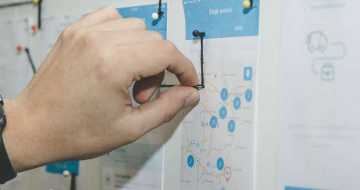- Blog
- benefits of personality tests
Contents
- Why should you consider taking a personality test?
- Which personality test should I take?
- How is career choice related to personality?
- Do personality traits predict career choices?
- How is personality related to professional development?
- How to develop your professional career with a personality test?
- References and further reading
Why should you consider taking a personality test?
Many organizations are using personality tests to help them recruit and select for a wide range of positions. However, personality tests can also help professionals who are seeking career advancement or promotion. Personality tests are useful because they show individual strengths that enable professionals to determine where their talents are best served.
When individuals have a greater knowledge of their personality, they can discover careers and places that match their personality. Having a knowledge of who you are can also assist in the interview process as you gauge what an employer is seeking in terms of the ideal employee.
Which personality test should I take?
One of the best personality tests for career development is the NEO PI (Costa & McCrae, 2008). This measure focuses on the Big Five personality traits:
- Conscientiousness
- Openness to experience
- Extraversion
- Neuroticism, and
- Agreeableness.
The test is the optimal choice because it has demonstrated excellent validity and reliability coefficients. Other more popular tests like the Myers Briggs Type Indicator (MBTI) have failed to demonstrate sound psychometric properties.
There are two versions of the NEO – a self-report and observer-report version. The questionnaire is long consisting of 240 items, but the authors have shown validity for a short 60-item inventory – the NEO FFI. The test takes between 30 and 40 minutes to complete. It is probably best to access the personality measure with the help of a consultant who is knowledgeable about personality assessment, such as one of the team members at CQ Net-Management skills for everyone!.
The summary of your assessment provides a description of three levels (high, medium, and low) for each of the five personality traits. For example, if an individual obtains a low score on neuroticism, the report would read “secure, hardy and relaxed even under stressful conditions.” (Costa & McCrae, 1985).
TIP
There are many different personality tests available. The problem is that only a few of them meet the basic quality criteria required to predict personality traits. You should be aware of this quality criteria outlined in our article about how to select the right personality test.
How is career choice related to personality?
How a career develops over time is influenced by individual values, personality and goals (Savickas, 2013). Research has shown that personality predicts the career roles that people occupy (Parker et al., 2010; De Jong et al., 2014) with some career roles appearing as more attractive than others.
When individuals have career roles that are aligned with their personality traits, this increases the intrinsic motivation of work duties. It makes sense that certain roles allow individuals to express their personality traits more than others.
For example, a person who scores high on extraversion will probably be most comfortable and intrinsically motivated when they are able to interact with others. A good career for this individual would probably be in sales and marketing.
Obviously, there are external factors that can influence career choices such as the demand in the market for particular professions; however, by and large, individual preferences or personality traits will influence people’s career choices (Parker et al., 2010; de Jong et al., 2014).
Do personality traits predict career choices?
Previous research on the linkage between personality traits and career choices show that personality is related to vocational interests. There are six types of vocation interests (Holland, 1997):
- Realistic,
- Investigative,
- Artistic,
- Social,
- Enterprising, and
- Conventional.
In a meta-analytic review, the personality trait of openness to experience was related to interests in investigative and artistic careers; extraversion was related to social and enterprising careers and conscientiousness was related to enterprising and conventional careers (Larson, Rottinghaus & Borgen, 2002).
This makes it easier for professionals to determine the types of careers that are suitable for them through examining their understanding their personality types. For example, if you score very high on openness to experience this suggests that a career in the arts is a good career path for you.
How is personality related to professional development?
Professional development is a life-long commitment and involves understanding your role in a particular profession and identifying the skills to carry out the role effectively. For many professions, this means keeping skills up to date particularly as new technology is evolving and the way in which organizations operate is changing due to the 4th Industrial Revolution.
For effective professional development to occur, it is important to stay abreast of important changes in order to acquire the knowledge, skills and competencies that are important for career advancement (Johnson & Beehr, 2014).
For example, imagine that you are an IT professional and wish to get a promotion. To gain the promotion, it is important that you gain IT training as part of your professional development. Personal development is related to professional development yet is distinct. Imagine you are an IT professional who wishes to gain promotion within your firm, yet you have received feedback that you are frequently late in meeting deadlines.
To counter this feedback, you engage in time management training so that you become better at meeting task deadlines. This is an example of personal development training and this type of training can help you with your career development.
Having a knowledge of your personality traits can help you determine the types of professional and personal development that you need. For example, someone who scores low on extraversion yet is seen as having management potential would benefit from communication skills training in order to boost their skills in social interaction.
How to develop your professional career with a personality test?
To summarize, there are several steps you can take to develop your career.
- Step 1: Take a personality test, preferably the NEO, to identify your high scores on personality traits
- Step 2: Align the personality scores with potential career paths to ensure that you are heading in the right direction
- Step 3: Reflect on this alignment and consider whether you are working in the right organization and in the right career. If you are unsure, then connect with a counselor to gain career guidance
- Step 4: If you are aligned with the right career, then consider how you can best demonstrate your strengths through development and experience. For example, if you score very high on openness to experience, then consider how you can be more creative in your job. Speak to your supervisor about assignments that will demonstrate this personality trait.
References and further reading
Costa, P. T., McCrae, R. R. (1985). The NEO personality inventory manual. Odessa, Flo: Psychological Assessment Resources.
De Jong, N., Van Leeuwen, R. G. J., Hoekstra, H. A., & Van der Zee, K. I. (2014). Measuring identification with career roles, CRIQ: an innovative measure using comparison awareness to avoid self-presentation tactics. Journal of Vocational Behavior. 2, 199–214.
Holland J.L. (1997). Making vocational choices: A theory of vocational personalities and work environments (3rd ed.), Psychological Assessment Resources, Odessa, FL
Johnson, V. A., & Beehr, T. A. (2014). Making Use of Professional Development: Employee Interests and Motivational Goal Orientations. Journal of Vocational Behavior 84.2, 99-108.
Larson L.M., Rottinghaus P.J., & Borgen F.H. (2002). Meta-analyses of big six interests and big five personality factors. Journal of Vocational Behavior, 61, 217-239
Parker, S. K., Bindl, U. K., & Strauss, K. (2010). Making things happen: a model of proactive motivation. Journal of Management. 36, 827–856.
Savickas, M. L. (2013). “Career construction theory and practice,” in Career Development and Counseling: Putting Theory and Research to Work, 2nd Ed. eds S. D. Brown and R. W. Lent (Hoboken, NJ: Wiley), 42–70.
Top Rated
About the Author

Comments
Most Read Articles
Blog Categories
RELATED SERVICES









Add comment